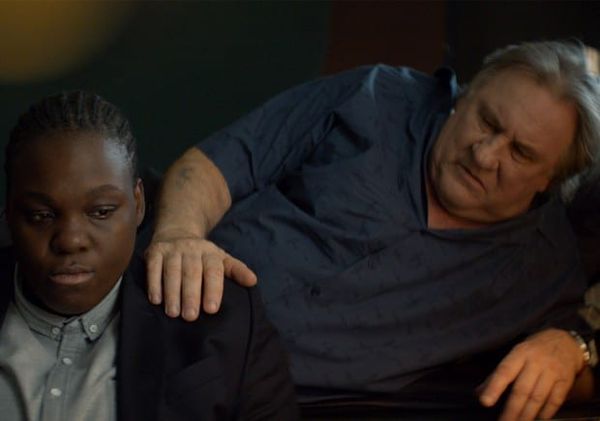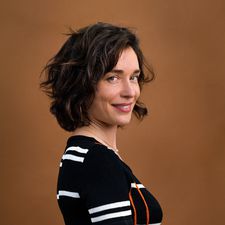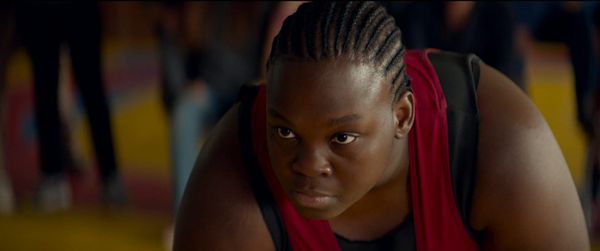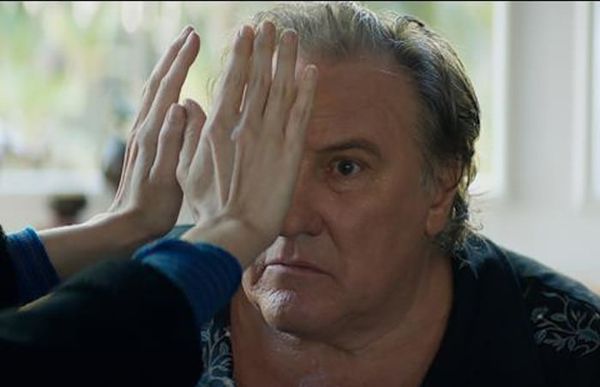 |
| Constance Meyer: 'I organised the meeting between them, we went to his place something like six months before shooting. And I had no doubt when I saw them together' |
 |
| Constance Meyer: 'The script was very written and, and as I worked with Depardieu before, it was completely nourished by what I knew of him' Photo: Courtesy of Semaine de la Critique |
CM:: Yeah, it was both Gérard and Déborah who were on my mind when I started to write. I can't really explain why this kind of association came, but it's, I was really inspired by Gérard as an actor and Déborah is absolutely amazing. I had this image that kept coming back, that was like, a sort of inversion of a gallant scene, with a man who was fainting in the arms of a woman. I thought it was kind of comical, but also had this kind of tenderness and tragedy to it. And so it was both this image coming back and wanting to work with Déborah and Gérard that was the origin of this script.
AW:: It's very playful, in terms of your approach to Gérard Depardieu's own reputation. How did he react when he saw things like the Air France line that's in the script. Obviously, although this character isn't him, there's certainly a shade of Gerard Depardieu running through this character.
CM:: Well, the script was very written and, and as I worked with Depardieu before, it was completely nourished by what I knew of him. But I didn't want to take a voyeuristic approach to his life, and I didn't want to manipulate and I didn't want him to feel manipulated. So that started with the writing. I had a very precise script, that's basically very close to the final cut. And I sent him the script. Immediately he, of course, wanted to talk about the scenario and wanted some, maybe some details about what the character was, and what the relationship with the girl was. But he had a trust, because he's such an experienced actor that he knows that once there is a script, there is mise en scene, there is a camera and he wanted to know more about how I was going to film, and who the character was. And as soon as he felt that he would be framed, in all the meanings of the term, and that he could trust that, then he gave himself to the part. And I thought that was a very interesting, generous approach to acting. And actually, Déborah was very similar in her approach, because I didn't know her as I knew Gérard when I wrote, but I still was very inspired by who she was and what her body felt like and her voice and also, I knew a little bit about her past because I talked to her. So it's not a bad biographical at all, but there is a little bit of reality in there that is not necessarily in the characters or in the writing but more like a sort of presence.
CM:: I think that's what attracted me to both of these actors. Because what I like is the contrast and the contradictions within an actor, and Gérard Depardieu, who has this very intense virility in appearance, but then the way he speaks and the way he moves can be very feminine and very delicate. And she also has this very interesting contrast between this calmness, but also a big femininity also very, she can be extremely feminine and beautiful, and also has this kind of authority to her. Also, they both look like children, which I love. It's not just about physicality, because sometimes I was asked, Do you want to represent, you know, bodies that are not “normal”?
AW:: Not on the big screen, let’s say. I think they're probably more normal in real life.
CM:: Exactly. Obviously, in real life, there are more people like them than like what we see on screen. But the origin was my desire for those characters and not necessarily something political, I didn't want the, the political gesture behind it to erase the poetry of their encounter. If their physicality and the fact that we realised by watching them, ‘Oh, it's not usual that we see those types of actors on screen,’ then it's good, because people will definitely move a little bit in their perception. But that wasn’t the original idea.
AW:: I think one of the interesting things about the physicality of the actors is that you're presenting two very different sort of ways of life. He is quite ill, basically, he obviously isn't exercising, he's eating far too much. Whereas she is a bigger girl, but that's because she wrestles. When it came to the wrestling did Déborah have to learn how to do that.
CM:: Yeah, she didn't know how to wrestle at all. And it was quite a challenge because she's not a particularly sporty person, but she's extremely dedicated to the character and to the veracity of her performance. I didn't want for her to be imprisoned in a performance that should absolutely be completely credible. First of all her size and weight is not doesn't exist in wrestling. She is far too tall and too strong for this sport, generally, wrestlers are smaller. But I didn't care. I was just in love with her and I just needed her to be this character. And I think she did an amazing job. I just wanted her to feel at ease with the choreography and with the sport, and it was just a way to express herself and to act. She followed three months coaching with the coach that I met a few years ago, and who was really the reference for all the wrestling sequences.
AW:: I like your gentle approach to metaphor in this movie, in the sense that there she is grappling in a kind of quite combative way, in her off hours. Yet in her job, she combats the George character with kind of a calm energy just sort of soaks the whole thing up rather - she's basically acting as a sponge for him. I mean, were you ever worried about that dynamic?
 |
| Constance Meyer: 'I didn't want it to be freestyle. And there was no improvisation or anything' |
CM:: Yeah, it was a big challenge for me actually, before starting to shoot. Until they met, I was telling myself, I have to find someone that can be as good as Gérard, as good an actor and have the intelligence as an actor not to try to be in competition. And also Gérard be generous enough and curious enough to give space for another actor. So I organised the meeting between them, we went to his place something like six months before shooting. And I had no doubt when I saw them together. First of all, it's a physical presence thing, that I was suddenly sure that there was something there. Also, their approach to acting is obviously different, because one is 70 years old, and the other is very young, and they don't have the same history and all that stuff. But there was something very similar, I can't really explain and I thought, ‘It's going to work. I just need to frame Gérard so that he feels like there is a certain part that he needs to play. And her space is another space. And then, you know, they're going meet at this point'. I didn't want it to be freestyle. And there was no improvisation or anything.
AW:: This is a film that really is all about mood. There aren't a lot of major plot shifts in it. It is about this connection between two people who have their own brand of loneliness, if you like. Loneliness seems to be a theme you're quite interested in. In general, it's something that you've been returning to. What do you think drives you to be interested in that?
CM:: Once again, I can't really rationalise it in a way but yeah, solitude and loneliness, and people who are lonely and who meet despite, you know, their difference is something that comes back in my writing. It comes back in the short films that I made, which are always the story of two people meeting, even if it's the baby with Gérard or my first film that I did at Tisch School, which was also an encounter. I guess it also has to do with a sort of relation to childhood, and how the two characters are like to two children. They have their bubble and when they meet a lot of sort of chemistry happens that gently, not dramatically, changes, changes their relationship to themselves and to the world.
AW:: The score was really interesting, with the use of the - a stripped back approach to the music. Was that something that you also had in mind to start with or did that come through working with the score writer?
CM:: David Babin, read the script and maybe six months before the shoot, we started to talk about it. At that point, we had a sort of idea that the score should be something very robust with really big instruments, like tuba and brass. But then I shot the film and as I started to edit, I felt like I needed something very pure and kind of lullaby to start the film. The lullaby is no longer in the in the movie, but it kind of accompanied the whole editing, because it was opening the film. But then I took away the lullaby - just to show you how weird the process was. We got rid of the lullaby but it gave us the tone of the film. And I love acapella singing because I already had used it for Rhapsody, my short film, and so we started to work on that.
The film will be released in the UK next spring.






















